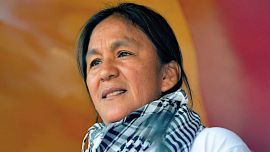Ecuador reached a preliminary agreement with some of its largest bondholders to restructure US$17.4 billion in outstanding debt, reducing the nation’s obligations significantly over the coming decade.
President Lenín Moreno’s government intends to exchange 10 existing bonds maturing between 2022 and 2030 for three new notes due in 2030, 2035 and 2040, reducing the average coupon rate to 5.3 percent, according to the Finance Ministry. Under the proposal, interest payments would resume at the beginning of next year, while the earliest principal would come due in January 2026. The plan still needs approval from a share of the remaining creditors.
Funds managed or advised by AllianceBernstein, Ashmore Group Plc, BlackRock Inc, BlueBay Asset Management LLP and Wellington Management Company LLP are among those supporting the deal, the ministry said in a statement. It said discussions will continue with other bondholder groups.
“With this, we’re freeing up US$16 billion over the coming 10 years,” Moreno wrote on Twitter.
The accord generates savings of US$1.4 billion this year and practically gives Ecuador a grace period of two years, Finance Minister Richard Martínez added in a conference call.
The nation’s benchmark notes due in 2028 advanced to 42.5 cents on the dollar on Monday, more than double their low of 20 cents in late March.
Under the previous administration of Rafael Correa, who was found guilty of corruption in April, the former OPEC member defaulted in 2008 and then aggressively sold debt when the price of oil declined sharply. A plunge in crude prices earlier this year, coupled with the Covid-19 crisis, forced Moreno’s government to ask creditors to consent to a suspension of debt payments while his team negotiated a deal with them as well as the International Monetary Fund.
The IMF’s favourable view of today’s accord will help to convince further bondholders to agree to the restructuring, said Martínez. The government also hopes to reach an agreement with the IMF for a new credit line by the end of August. The ministry is also negotiating a re-profiling of bilateral debt with China and the disbursal of additional funds from the Asian country this year as it still needs to close a financing gap, he added.
“The result is much more positive for Ecuador than I’d expected,” said Santiago Mosquera, a Quito-based analyst at boutique investment bank Analytica Investments. “Interest rates and coupon payments are low, which is what Ecuador needed.”
The debt accord would give the nation considerable breathing room, well beyond when Moreno’s term ends next May. Political opponents have criticised the president and his finance team for not taking a more aggressive approach in the restructuring talks. Yet they’ve won praise from key creditors who say Ecuador officials have been much more reasonable than their counterparts in Argentina, where negotiations have dragged on for months.
“It took Argentina 15 years to return to the market,” Martínez said on a conference call in late May before the debt talks picked up. “Ecuador cannot fall into something like this. That would be very traumatic for the country.”
The nation’s largest reported bondholders include Ashmore, BlackRock and Goldman Sachs Group Inc, according to data compiled by Bloomberg.
by Ben Bartenstein & Stephan Kueffner, Bloomberg




















Comments